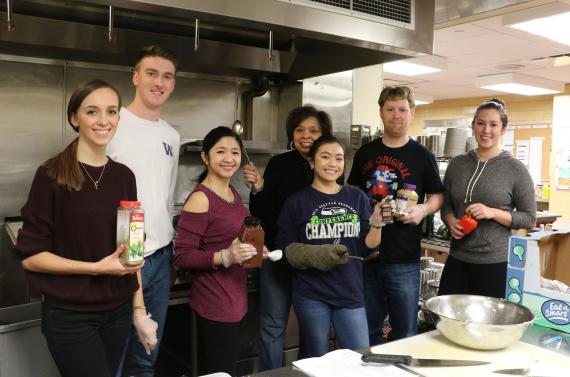In Winter Quarter, a group of anthropology students, faculty, and staff gathered in the Husky Den Kitchen to cook together. The objective was to prepare a series of meals for Tent City, a self-managed community for homeless men and women that had settled into its temporary home for a three-month stay in the parking lot behind Wallace Hall on Brooklyn Avenue.
The project was a service learning opportunity that emerged from Ann Anagnost’s course “The Cultural Politics of Diet and Nutrition” (ANTH 311) which explores the health effects of unequal access to quality nutrition. The goal of the project was to cook three evening meals using organic local ingredients whenever possible while keeping the project affordable. The menus featured black bean chili, lentil stew, and pasta Bolognese offered on three consecutive Thursdays in February.
Students expressed appreciation for the opportunity to cook together and also to learn more about the residents of Tent City. The residents invited the students to tour the encampment and eat with them in the dining tent. For many students, the opportunity to visit and converse with Tent City residents gave them a better understanding of the challenges of homelessness and also helped them to break through the invisible barrier between Tent City and the university community.
Anthropology undergraduate, Kyla Hasenpflug, mentioned in her reflection piece on the experience, “it was a bit of a wake-up call when we discussed how to create ‘stick to your bones’ meals that were still nutritious in our introductory meeting. Whenever I thought about staying warm while still being exposed to inclement weather, blankets, tents and tarps came to mind. Yet eating wholesome and filling food is just as important as having adequate shelter.” She also found herself revising her stereotypes of homelessness. “There are many reasons that someone could fall on hard times,” she said, “and Tent City was filled with people who appreciate the community they have found.” For this student, the experience of interacting with residents broke down misconceptions based on fear and made her realize the importance of hosting Tent City. It helped to make the university a more welcoming place for those who are often invisible to the campus community.
